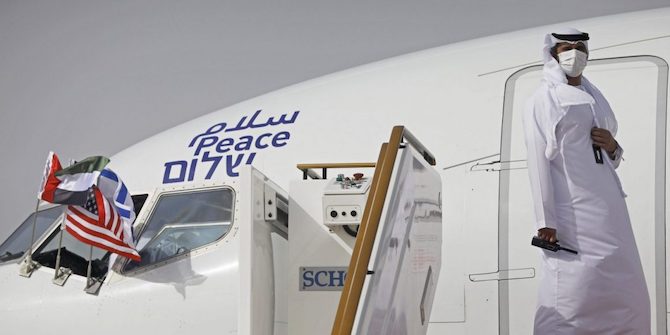by Doron Matza and Adam Hoffman

Forty years ago this month, on 26 March 1979, Israel and Egypt signed a historic peace treaty. While such a public diplomatic achievement between Israel and the Arab world only happened once more – with Jordan in 1994 – Israel’s relations with the Arab states are characterised today by unprecedented cooperation and semi-public relations. This is a real revolution, but one which for the most part is taking place beneath the surface. Partial expressions of it, such as the growing cooperation between Israel and the Arab Gulf states against Iran, emerge occasionally and reveal the extent of the change to the regional reality. A recent example of this was the participation of key Arab states alongside Israel in the US-led Middle East conference in Warsaw.
Throughout Israel’s history, its relations with the Arab world were characterised by one of two polar situations: outright war or precarious peace. These situations largely reflected a modernist mindset of ‘either or’, which also shaped the character of international politics more broadly and were driven by the pursuit of final peace settlements for conflicting national aspirations. During the last decade, however, this mindset has been replaced by a post-modern model of international relations which is based on the idea of a middle-ground – that is, no longer war or peace but a spectrum of possible relations different in their depth and contents which span between these two clearly-defined situations.
This process was influenced by the diminished standing of the United States in global engagements. Instead of the New World Order which was declared by former US President George H. W. Bush following the end of the First Gulf War, the vision of ‘a New Middle East’ which was articulated by Shimon Peres during the early 1990s and the subsequent disillusionment from the initial euphoria of the Arab Spring, the Middle East has been turning in recent years to a new model of regional politics, in which the quest for a final peace settlement between Israel and the Palestinians has been replaced with a more modest pursuit of pragmatic arrangements, seeking to create a temporary but stable order amidst waves of change and instability.
Instead of formal agreements driven by a comprehensive and values-based approach, these new relations are based more on the pursuit of particular actors’ specific interests. As a result of this new model, the challenge of the Iranian threat to the Sunni Arab states has become an axis upon which the cooperation between Israel and the Gulf states rests: as Ian Black recently pointed out, ‘fear of Iran, above all, is what has brought Israel and the Gulf states together.’ Abdulrahman Al-Rashed, a prominent Saudi journalist and the former editor-in-chief of the pan-Arab daily Asharq Al-Awsat, even claimed that following the United States’ withdrawal from the nuclear deal with Iran in May 2018, Israel’s new regional role will be that of ‘a police force that monitors and holds Iran accountable’. However, for this closer cooperation between Saudi Arabia and Israel it has not been considered necessary to formalise relations or achieve a highly-publicised peace agreement. Other examples of the new regional logic are the payments which are transferred to Hamas (with Israel’s consent) by Qatar, which has deep ties with the Muslim Brotherhood, and Israel’s assistance to Egypt in fighting terrorism by carrying out dozens of airstrikes against ISIS-affiliated targets in Egypt’s northern Sinai.
However, despite the mutual interests of containing Iran’s regional ambitions and fighting terrorism, it isn’t security issues alone which have redefined relations between Israel and Arab states in the past decade. This partnership is also sustained by economic interests, which reflect Israel’s position as an actor which offers significant advantages to other states in the region. Ian Black’s recent research points out that ‘there is … a pragmatic recognition in Gulf capitals of the benefits of security, technological and economic links with an unassailably powerful Israel.’
As mutual interests have become a key factor in shaping Israel’s relations with the Arab world, along with the diminished need for formal peace treaties as a condition for cooperation and the collapse of pan-Arab unity in the region, Israel and its regional partners in recent years have been able to deepen their cooperation even under a shade of ambiguity. Along the way, a major pre-condition for Arab relations with Israel has been dismantled: the final agreement between Israel and the Palestinians, which the Saudis defined in their 2002 Arab Peace Initiative, has been practically emptied of all substance by the Saudis themselves, given their increasingly close relations with Israel.
To be sure, Arab states are still uneasy with accusations of public cooperation with Israel: Saudi Arabia’s Minister of State for Foreign Affairs Adel Al-Jubeir stated that his country has no relations with Israel and that Saudi Arabia ‘maintain[s] that there is no normalization without a peace process’, and Kuwait’s Deputy Foreign Minister rejected the idea that a group photo taken with Prime Minister Benjamin Netanyahu at the Warsaw Summit meant the normalisation of ties between his country and Israel. Even in Egypt – which has had a formal peace treaty with Israel since 1979 – any hint of normalisation between the two countries creates a public outcry. Thus, since the famous ‘three-no’s’ resolution taken in the Khartoum summit in 1967, ‘normalisation’ remains a controversial term with extremely negative connotations in Arab discourse towards Israel.
But the focus on normalisation – either as an aspiration for many Israelis or as a feared development by some in Arab public opinion – misses the bigger point of the new regional logic. ‘Normalisation’ has gradually been replaced by cooperation based on mutual interests, while ‘peace’ has been replaced by a series of arrangements whose content and extent are changing and flexible. In this new realist logic, Israel is increasingly seen as a fact of life in the region: as an editor of an Arab news organisation stated in November 2018, Israel is ‘a fait accompli … it’s the reality’ in today’s Middle East.
This is a new regional logic which serves both Israel and its Arab partners. It allows the Arab Gulf states to have extensive economic ties with Israel, to enjoy its political support in their regional struggle against Iran and its influence on the Trump administration, without risking a negative reaction from Arab public opinion. For the Israeli government, this situation allows it to deepen Israel’s regional presence even without any commitment to territorial withdrawals, as would most probably be required from it in any future peace treaty. In other words, while the optics of the relationship between Israel and the Arab world remain largely unchanged, the substance of that relationship has transformed dramatically.
In a long-term historical perspective, this change constitutes a real revolution in Israel’s standing in the Middle East. The extent of this change is so dramatic that it erodes the well-known Israeli metaphor of Israel as ‘a villa in the jungle’, which sought to express the tension between Zionism’s turn eastward and its discontent over the years towards the Arab world and its people. This reality is largely dependent on Israel’s ability to create value for other states in the region in a reality in which relations between states are based on functionalism and strategic calculations. A key question in this regard will be the impact of the Trump Administration’s anticipated ‘deal of the century’ on the Middle East. It can be assumed, based on the limited information currently known about the plan, that if the content of the ‘deal’ will not be in line with the logic of the new emerging reality in the region, its fate will be similar to that of other peace proposals presented in the past by the United States and other external actors.
 Doron Matza is a lecturer in Middle East Studies at Achva Academic College and a former senior official in the Shin Bet, the Israeli internal security service.
Doron Matza is a lecturer in Middle East Studies at Achva Academic College and a former senior official in the Shin Bet, the Israeli internal security service.
 Adam Hoffman is a PhD Candidate in political science at the Hebrew University of Jerusalem and a junior researcher at the Doron Halpern Middle East Network Analysis Desk at the Moshe Dayan Center, Tel Aviv University. He tweets at @AdamHoffm
Adam Hoffman is a PhD Candidate in political science at the Hebrew University of Jerusalem and a junior researcher at the Doron Halpern Middle East Network Analysis Desk at the Moshe Dayan Center, Tel Aviv University. He tweets at @AdamHoffm






